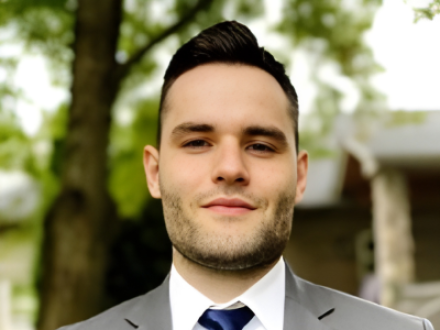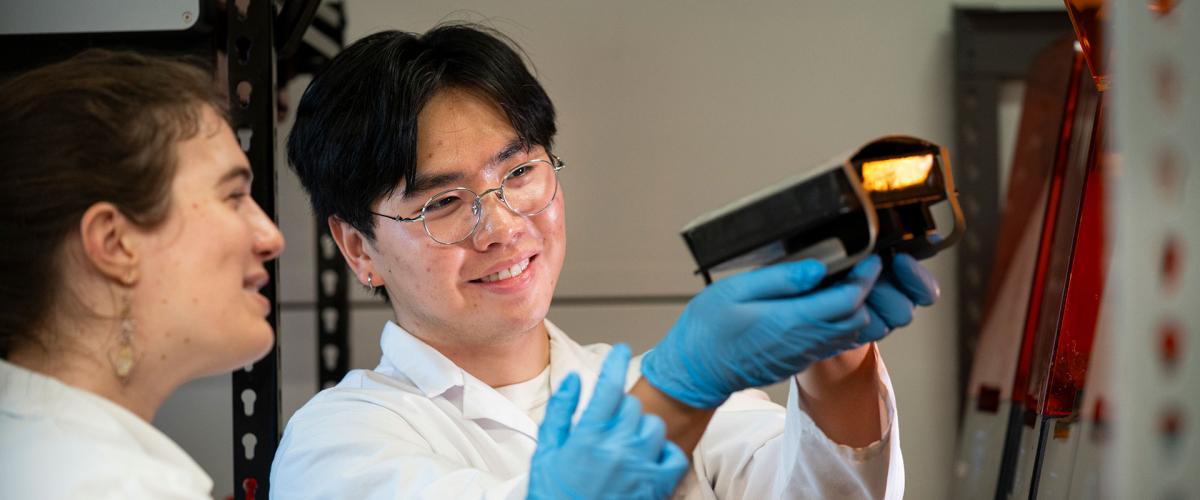
The next generation of defense technology: Michael LaFramboise’s thoughts on entrepreneurship in defense
Michael LaFramboise (CWR '18) is the CEO and co-founder of Aurelius Systems, a San Francisco-based defense startup developing autonomous laser systems to shoot down drones. Their flagship product, Archimedes, is a cost-effective, scalable robotic turret that combines advanced sensors, AI, and high power lasers to detect and neutralize drones in seconds
Where did your inspiration to start Aurelius Systems come from?
After I graduated from Case [Western Reserve], I went into the Navy, then worked in the automotive industry in Detroit for a bit before getting into optical systems. I worked at the optical materials company Coherent for a few years in R&D and then technical sales, selling basically everything that would go into a laser weapon.
After that, I ended up pursuing a PhD at Columbia, specializing in nano optical systems. By that time, it was clear to me that the drone issue had taken off and we were getting a glimpse of what the next war was going to look like.
The primes were building very big and exquisite laser systems, but I realized there was a need for a low-cost, edge-deployed alternative, so I dropped out of Columbia to build that.
What's been your favorite part of the journey in running Aurelius so far?
Getting to hire my own team and work with a bunch of smart people who are totally committed to the same goals. It’s been a treat to spend money on my own mission and coalesce really great people around me to do that.
What’s also really exciting is being able to provide the solution to a massive vulnerability in our defense strategy. Right now, if 5,000 weaponized drones showed up on the coast of New York or San Francisco or any of our military bases around the world, everything would be destroyed. When we go into the market, we will be providing the answer to that, which is really exciting.
Earlier in my career, I was a product manager at Amazon working on consumer hardware and made great money, but was completely unfulfilled. We’ve created this organization where we can deliver something that actually matters to the end users, with massive upside for ourselves, and working with the best people we can find. Having all of those aligned is the most exciting thing to me.
Laser weapons are still in their infancy as a technology, but there are a few products already out in the field. What’s your strategy to beat the primes who are also developing laser-based weapons systems?
The primes would never do something like what we’re doing. It’s a classic case of the innovator’s dilemma. I’ve heard of laser weapons projects at primes being killed because they would outcompete their missile programs. Why would you invest R&D in a system that’s going to obsolete your existing revenue stream? That’s why startups win. If they’re making a lot of money on something, they’re not going to look at ways to disrupt that.
As for the existing laser systems, they’re all Ferraris. We’re using parts from the automotive and industrial sectors to drive the cost down and build a Corolla.
What’s something you think you do right with Aurelius that other defense tech startups do wrong?
I think a lot of these companies always chose the PhD, 130 IQ option for their designs. We always choose the 70 IQ option. What that does is it gets you to the rock bottom, most barebones, lowest cost product possible. We’re not a research company, we’re building and deploying products as fast as possible, so we go with the most basic, simplest approaches to engineering decisions.
What’s something you think you do right as a startup CEO that you think other startup CEOs do wrong?
I’m extremely involved in technical development. The technical roadmap is defined by me and my co-founder, and we are involved in a lot of the design and engineering. We’re reading textbooks, talking to vendors, and making new designs.
It gets harder as the company grows, but I try to spend at least a quarter of my time doing that. For the first year, I was spending 80% of my time on engineering. It takes a lot of time, but it’s valuable. If you didn’t build something yourself, it’s very hard to know how it works.
What was the most valuable thing you got out of your time at Case Western Reserve?
Learning how to do technical work. At Case [Western Reserve], I learned how to develop new things from scratch and have a fundamental understanding of how they work. I still use many of the technical skills I learned at Case [Western Reserve] today. When we’re characterizing a new turret design and have a bunch of frequency responses, how do I read Fourier transform diagrams to analyze those? Fundamental, but really useful things like that.
Let’s say in 10 years you accomplish everything you want to with Aurelius and exit with a billion dollar check. With the only condition being you have to start a company in an industry completely unrelated to Aurelius (i.e. no defense, no AI, no lasers, no robotics), what company would you start?
I’d want to make unique, big sedans again. Get an EV skateboard as the bottom for the vehicle, then give 20% of the company to a designer from Ferrari or Maserati to design the car and 3D print a custom shell over the base. No AI, no ADAS, focus on driver performance, and go really aggressive on the marketing.
Someone should really do that and apply to YC with it. If they do I will 100% be there to help them as an advisor and support development and fundraising.




